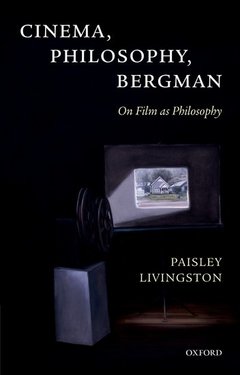Cinema, Philosophy, Bergman On Film as Philosophy
Langue : Anglais
Auteur : Livingston Paisley

The increasingly popular idea that cinematic fictions can 'do' philosophy raises some difficult questions. Who is actually doing the philosophizing? Is it the philosophical commentator who reads general arguments or theories into the stories conveyed by a film? Could it be the film-maker, or a group of collaborating film-makers, who raise and try to answer philosophical questions with a film? Is there something about the experience of films that is especially suited to the stimulation of worthwhile philosophical reflections? In the first part of this book, Paisley Livingston surveys positions and arguments surrounding the cinema's philosophical value. He raises criticisms of bold theses in this area and defends a moderate view of film's possible contributions to philosophy. In the second part of the book he defends an intentionalist approach that focuses on the film-makers' philosophical background assumptions, sources, and aims. Livingston outlines intentionalist interpretative principles as well as an account of authorship in cinema. The third part of the book exemplifies this intentionalist approach with reference to the work of Ingmar Bergman. Livingston explores the connection between Bergman's work and the Swedish director's primary philosophical source-a treatise in philosophical psychology authored by the Finnish philosopher, Eino Kaila. Bergman proclaimed that reading this book was a tremendous philosophical experience for him and that he 'built on this ground'. With reference to materials in the newly created Ingmar Bergman archive, Livingston shows how Bergman took up Kaila's topics in his cinematic explorations of motivated irrationality, inauthenticity, and the problem of self-knowledge.
Introduction. Illustrations. Part One: Surveying cinema as philosophy. 1. Theses on cinema as philosophy. 2. Arguing over cinema as philosophy. Part Two: An intentionalist approach to film as philosophy. 3. Types of authorship in the cinema. 4. Partial intentionalism. Part Three: On Ingmar Bergman and philosophy. 5. Bergman, Kaila, and the faces of irrationality. 6. Value, authenticity, and fantasy in Bergman. Conclusion.
Paisley Livingston has a B.A. in Philosophy from Stanford University and a Ph.D. from The Johns Hopkins University. He is Chair Professor of Philosophy and Dean of Humanities at Lingnan University in Hong Kong. He has held teaching and research positions at The University of Michigan, Ann Arbor, McGill University, l'École Polytechnique (Paris), Siegen University, The University of Aarhus, Roskilde University Center, The University of Copenhagen, and Zinbin (Kyoto). His last book was Art and Intention (Oxford: Clarendon). His other books are Ingmar Bergman and the Rituals of Art (Cornell), Literary Knowledge (Cornell) Literature and Rationality (Cambridge), Models of Desire (Johns Hopkins). He co-edited The Creation of Art (Cambridge) with Berys Gaut and The Routledge Companion to Philosophy and Film with Carl Plantinga.
Date de parution : 05-2012
Ouvrage de 240 p.
13.9x21.6 cm
Date de parution : 07-2009
Ouvrage de 226 p.
14.3x22.3 cm
© 2024 LAVOISIER S.A.S.



